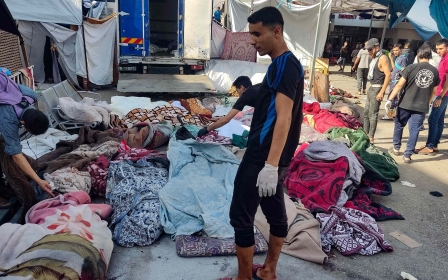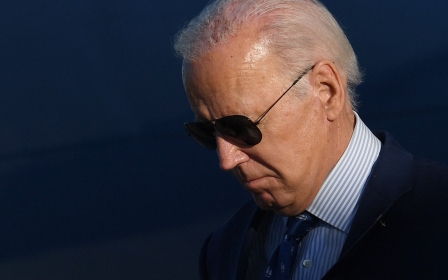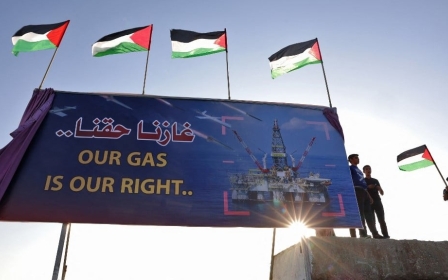Israel-Palestine war: Israeli forces storm al-Shifa hospital where thousands seek refuge
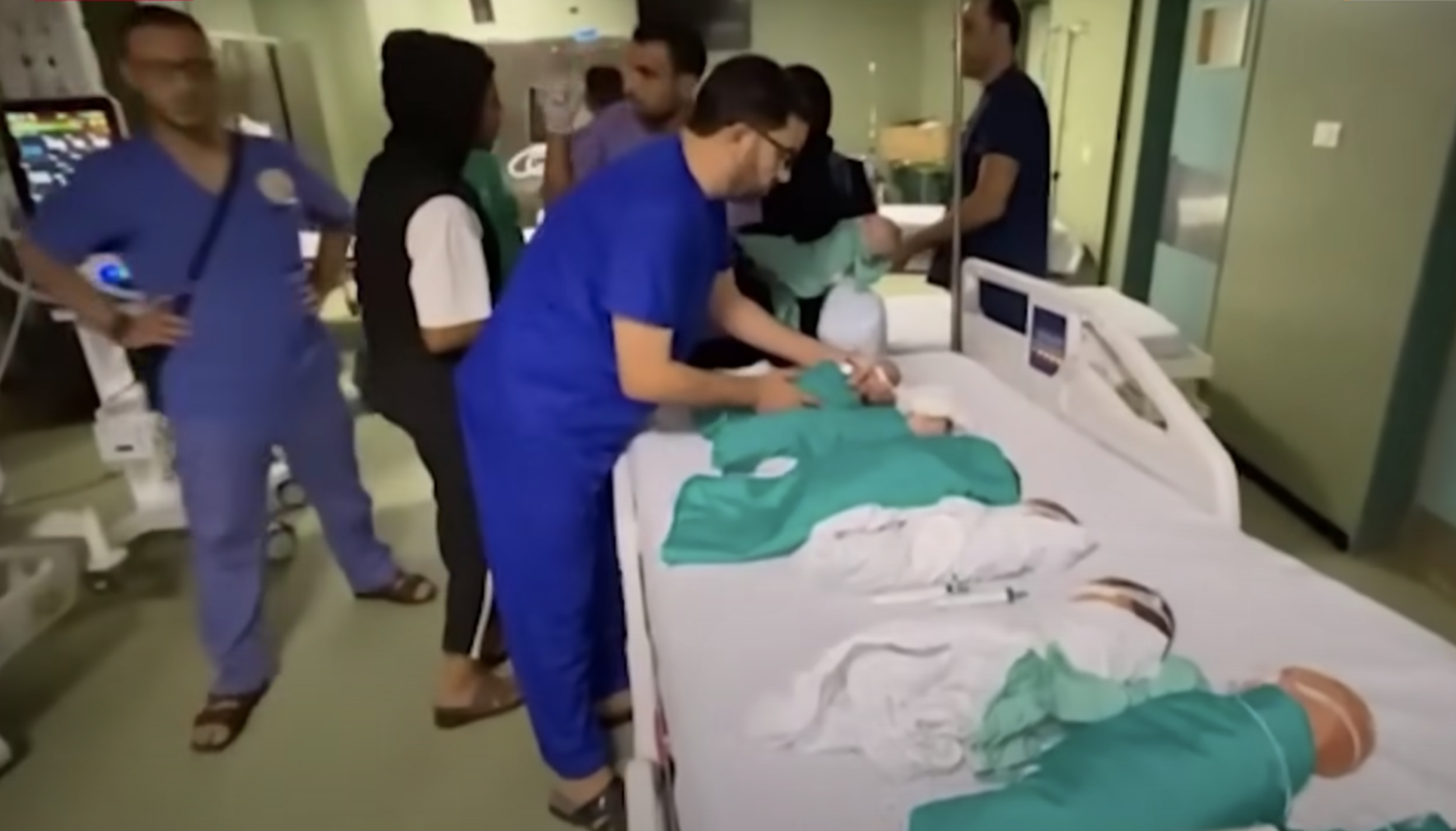
Israeli soldiers have stormed Gaza City's al-Shifa hospital, the largest medical facility in the besieged Palestinian territory, where thousands of civilians have been besieged for days, including premature babies, critically ill patients, displaced families and medical staff.
Troops broke through the northern walls of the complex, instead of entering via the main gate to the east, at around 2 am local time on Wednesday, according to local sources and health officials.
They went building to building inside the large facility, removing doctors, patients and displaced people to the courtyards before interrogating them, Middle East Eye has learned.
Some people were stripped naked, blindfolded and detained, according to doctors who spoke to Al Jazeera Arabic, one of the few international channels with access to sources within the hospital.
Soldiers searched different departments, including the cardiovascular, kidney and surgery specialist wards. They also inspected the basements.
New MEE newsletter: Jerusalem Dispatch
Sign up to get the latest insights and analysis on Israel-Palestine, alongside Turkey Unpacked and other MEE newsletters
The raid is ongoing hours after the initial storming, though tanks are not present inside the complex, according to Palestinian health officials.
Video shared by Al Jazeera, however, showed Israeli tanks stationed beside rubble on the outer perimeter of the hospital compound.
“The situation is bad. We can’t move and the sounds of explosions have not stopped," Ahmed Mokhallalati, a doctor inside the hospital, told MEE.
'The situation is bad. We can’t move and the sounds of explosions have not stopped'
- Ahmed Mokhallalati, Al-Shifa doctor
"The Israeli army told everyone to move away from the windows because they would be shooting," he added.
While Israel says its military has been conducting a “precise and targeted operation” at al-Shifa, Palestinians at the hospital say civilians trying to flee have been fired upon.
Doctors told Al Jazeera that Israeli soldiers were shooting live ammunition inside the hospital but there were no exchanges of fire. There were no immediate reports of casualties.
"It's like a war zone in the hospital, which is already suffering from a lack of supplies, water, food, electricity and everything," Mokhallalati told MEE.
"Everyone should help us protect the patients."
'Staging a scene'
Wednesday's assault comes after a days-long siege of the hospital complex, in which Israeli snipers and armed quadcopter drones opened fire on anyone trying to leave.
Israeli leaders insist the medical facility hides a Hamas command centre, without presenting any evidence. Israel's chief backer, the United States, has repeated the claim without presenting its reasoning.
The Palestinian health ministry and Hamas vehemently deny the accusation.
Follow Middle East Eye's live coverage for the latest on the Israel-Palestine war
Mokhallalati said they were "propaganda".
"There is nothing at al-Shifa medical centre,” he told Al Jazeera. "We don’t know what they will do to us. We don’t know whether they will kill people or terrorise them."
The Israeli army said weapons were found "in the area" without specifying where or providing any details or evidence. It added there was no indication captives are currently held in the hospital.
'The occupation army brought horror, bullets and explosions'
- Omar Zaqout, head of al-Shifa's ER department
In a statement, the army also said it brought in "incubators for newborns, baby food and medical supplies" to the hospital.
Omar Zaqout, the head of al-Shifa's emergency room department, denied receiving any aid from the soldiers.
"The occupation army brought horror, bullets and explosions only," Zaqout told Al Jazeera.
Human rights group Euro-Med Monitor said it is concerned that the Israeli army is "staging a scene" during their raid.
The monitor said that the Israeli army’s prevention of any health officials, media, international parties or NGOs being present in the hospital during the raid will “raise concerns and doubts over any narrative that will be issued later”.
The statement, published early on Wednesday, also said that the organisation is concerned over “sporadic gunfire heard inside the al-Shifa Hospital since it was stormed”.
“The only gunfire heard was that coming from Israeli forces,” it added.
“Allegations about the use of al-Shifa for military purposes would not require such a long time of raiding to uncover them. The length of time of the army inside the hospital raises concerns that the stage is being set for a pre-planned and artificial spectacle.”
Support and condemnation
In a statement on Wednesday, Martin Griffiths, the UN's humanitarian affairs and emergency relief coordinator, said he was appalled by the attack on al-Shifa.
"I'm appalled by reports of military raids in Al Shifa hospital... The protection of newborns, patients, medical staff and all civilians must override all other concerns. Hospitals are not battlegrounds," he posted on X, the social media platform formerly known as Twitter.
The Jordanian foreign ministry also accused Israel of violating international law and specifically the Geneva Convention for the Protection of Civilian Persons in Time of War.
The head of the World Health Organization, Tedros Ghebreyesus, also said on Wednesday that Israel’s military incursion into al-Shifa Hospital is "totally unacceptable".
Ghebreyesus added that “for the past three days, there have been no updates on the number of deaths and injuries in Gaza, making it harder to evaluate the health system functioning”.
The raid has the backing of the White House, which refused to condemn the operation but said, "We don’t want to see a firefight in a hospital."
Washington has provided "unconditional" support to Israel since a Hamas-led attack in Israel on 7 October killed around 1,150 Israelis, mostly civilians, of which at least 30 were children.
Since then, a ferocious Israeli air and ground assault on Gaza has killed more than 11,300 Palestinians, including over 4,600 children. More than 3,500 people are missing and presumed dead under the rubble.
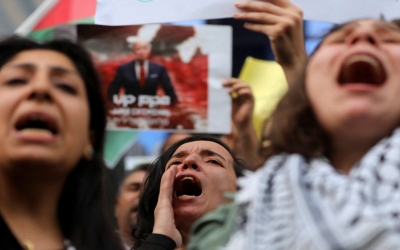
Washington has supplied a $14.5bn military aid package to Israel, shipped missiles and ammunition, and resisted calls for a ceasefire both from its own citizens and the United Nations.
Elsewhere in Gaza, the humanitarian situation continues to deteriorate with UN officials warning that their relief efforts are no longer sustainable under the present circumstances.
UNRWA chief Philip Lazzarini has also said his operation in Gaza is on the verge of complete collapse after several weeks of Israeli bombardment.
Heavy rain has also added to the misery of Gaza's residents.
While many have welcomed a source of fresh water, the downpour could provide the perfect breeding ground for water-borne illnesses.
Gaza’s sewage system failed after Tuesday's weather, leading to sewage flooding parts of the besieged territory as people continue to struggle to access clean water.
Outside of Gaza, Qatar said it was attempting to negotiate a deal on Wednesday between Hamas and Israel to release 50 Israeli hostages in exchange for a three-day ceasefire.
One official who spoke to Reuters said Hamas had agreed to the deal, but Israel has not.
Editor's note 15 November: An earlier version of this article stated that Dr Ahmed Mokhallalati had left al-Shifa hospital. This is incorrect. Mokhallalati remains inside the hospital as of Wednesday 14:00 GMT
Middle East Eye delivers independent and unrivalled coverage and analysis of the Middle East, North Africa and beyond. To learn more about republishing this content and the associated fees, please fill out this form. More about MEE can be found here.


